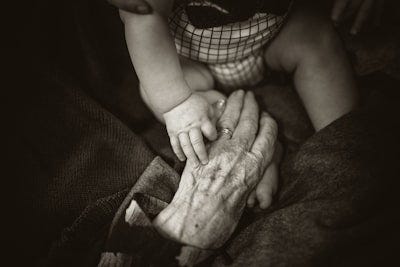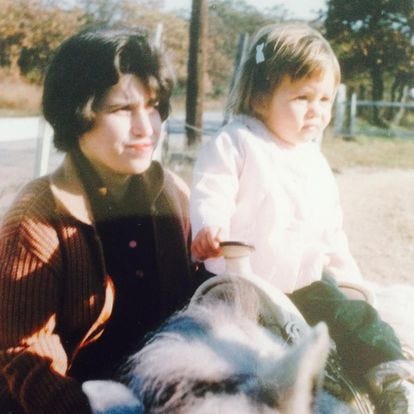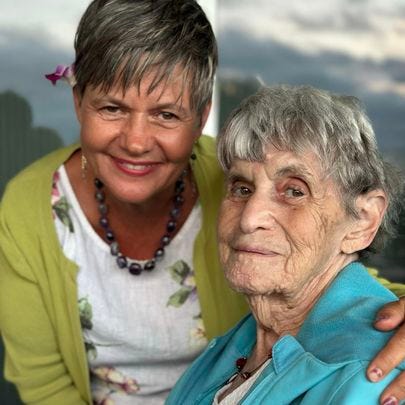For caregivers, a compendium of resources to help you take care of yourself, too
Welcome to Living in 3-D's Compendium of Resources for being a caregiver, particularly a caregiver for a parent or loved one with dementia. You are not alone.
Hi everyone!
By the time you receive this in your inbox, I will be on week two of walking the legendary pilgrim route of the Camino de Santiago, making my way from my starting point in Porto, Portugal with my daughter Marielle. I can’t wait to share the experience with all of you.
I know that many subscribers to Living in 3D: Divorce, Dementia and Destiny have landed here because they are caregivers, particularly of aging parents and those with dementia, as was my experience. So today I am offering a Compendium of essays and resources on caregiving in general and dementia in particular. It includes all my essays to date related to dementia, caregiving and some about grief (a topic I will be returning to; there is no real beginning and end to the work of grief). I also recommend the work of other Substack writers on these topics well as books, articles, podcasts and other resources I have come across in the past few years. Caregiving can demand so much of us but we need to remember to not neglect our own care in the process. I hope you find these resources both comforting and empowering.
I will keep adding to this Compendium of Resources over time. Please help me keep it as useful as possible. Let me know in the comments if you have other recommendations to add: Substack writers who write on this theme, books, articles, podcasts, TED Talks, anything at all that could help us manage our role as caregivers with a bit more ease and self-compassion.
Living in 3-D Essays on Dementia, Caregiving, Grief
While these articles and essays focus on dementia caregiving in particular, the experiences I believe are universal to many caregivers’ situations. These are in chronological order since I began publishing in October 2023.
Caring for my mother with dementia is an act of love that nearly broke me
Even in the locked world of dementia, the power of storytelling survives
A Q&A with advocate and activist Ai-Jen Poo on how to break the isolation of caregiving
In caring for aging parents, can we see assisted living as assisted loving?
For dementia caregivers, the heartache of impossible choices
Dementia is a thief that steals from us all
‘I wish I could be like a bird in the sky’
A celebration of life is the best antidote to grief
Anticipatory grief kept me from falling hard
Nothing is every truly lost: memory, mother love and identity
'I wish I could be like a bird in the sky'
Don't let guilt steal your grief
Just an ordinary week wrestling with mortality
Nothing is ever truly lost: memory, mother love and identity
A celebration of life is the best antidote to grief
Other Substacks/Substack articles on caregiving
Victoria at Carer Mentor: Empathy & Inspiration curates an enormous wealth of knowledge based on personal caregiving experience and she is incredibly generous to her community and all of us at Substack who find our way to her and her newsletter. As she writes: “I’m a Carer to my Mum, a Mentor to clients seeking support along their career-life journeys, and an Advocate of carers.” Her weekly Substack is brimming with advice, encouragement and resources.
Aging Well News by Janice Walton, a psychologist who writes about caring for her husband with dementia. Check out her post, “Caring for the Caregiver,”arguing for a more comprehensive approach to care and how caregivers often belatedly realize the enormous “emotional, mental, physical, and spiritual responsibilities required” to care for a loved one with dementia or some other illness.
Lydia Fluitt writes Dementia, Vascular, about the experience of caring for an adult son with dementia. In her series, “Something Else You Didn't Want To Know,” she shares helpful knowledge with readers as her dementia vocabulary grows. It’s important for all of us, she writes. “Dementia is the new reality for all of us. We may be the caregiver, the long-time friend, the closest relative, or the next-door neighbor. Or, we may be the dementia patient. The Institute for Health Metrics and Evaluation has estimated that by the year 2050 there will be 150 million people with some form of dementia. That number is up from 57 million in 2019.”
Nancy Reddy on her Substack Write More, Be Less Careful, has a wonderful platform for writers to share about their experience of being “Good Creatures,” a series that explores the intersection of caregiving and creative practice, with interviews with caregivers on sustaining creative work. Read my own Good Creatures essay here.
In The Examined Family, Courtney Martin writes movingly about her father’s dementia diagnosis in articles like: “Existential debates in the minivan” and “Forgetting and becoming.”
From The Isolation Journals with Suleika Jouaud, have a look at “Prompt 300. On Caregiving & Conjuring,” a guest columnist and writers in the community come together to do this prompt: Write a letter to someone you love who is no longer on this side. Communicate across the ultimate divide.
In this edition of Letters from Love with Elizabeth Gilbert, guest columnist
, creator of the wonderful newsletter asks for love’s wisdom on caring for her aging and ill mother and Liz suggests this prompt: Dear Love, what would you have me know today about being a caregiver?Books on caregiving
In Love: A Memoir of Love and Loss by Amy Bloom: In this wrenching memoir, writer Amy Bloom recounts the decision her husband Brian makes after his diagnosis of Alzheimer’s, “to die on his feet, not live on his knees,” leading them to Dignitas, the Swiss organization that empowers a person to end their own life with dignity and peace.
The Swimmers by Julie Otsuka: This novel is an unflinching look at the losses of a woman in the grip of encroaching dementia and that of her estranged daughter, reentering her mother’s life too late. Despite the sorrows of implacable loss, Otsuka captures all that makes us human and therefore precious.
Still Alice by Lisa Genova: This novel is about Alice Howland, a linguistics professor in her prime watching the life she once knew fade away with a diagnosis of early onset Alzheimer’s. Genova, a neuroscientist, whose grandmother developed Alzheimer’s, brings both a compelling story and easily accessible scientific information to readers.
The Weight We Carry by Christina Consolino is a novel about a woman used to shouldering the burden of her own family and her aging parents. When her father falls, and refuses to stay at rehab, Marissa brings him own, upending her own life. Meanwhile, her mother Angie’s memory issues soon become a more urgent dilemma. Consolino captures vividly the toll that a health crisis can have on an entire family.
Articles on caregiving
The Mother Who Changed: A Story of Dementia, Katie Engelhart, The New York Times, also featured on The Daily podcast here and revisited here.
“Hard Seasons and Wild Hearts,” Brené Brown writes movingly about losing her mother to dementia in December 2023 after four years of caregiving. She writes:
I know that many of you are intimately familiar with the brutality of caregiving for someone with dementia. Yes, there are incredible moments of tenderness and closeness, but there are also unsparingly vicious parts of the helplessness and the hurt that manage to take you by surprise no matter how many times they happen. There’s also a certain jagged-edged grief that must be endured when someone you love is torn away in bits and pieces.
Podcasts
“The Answer to Caregiving Burnout with Ai-jen Poo,” We Can Do Hard Things
Brené Brown with Jason Karlawish, M.D. on The Problem of Alzheimer’s
Caregiver Storyteller Podcast, hosted by CaringKind. Hosted by Dr. Anne Kenny, it’s more than educational—it’s a space of empathy and understanding, highlighting the resilience, joy, and deep emotional connections that form in the face of adversity.
Films/TV series
Still Alice, a film version of Lisa Genova’s book, for which actress Julianne Moore in the title role won an Academy Award for Best Actress for her incredibly intelligent and moving portrayal of Alice.
The Leisure Seeker, starring Donald Sutherland and Helen Mirren as John and Ella Spencer, are on a road trip from Massachusetts to Florida in their RV. Married for over 50 years, Ella has ended treatments for cancer and John has Alzheimer's disease. Their illnesses are evident as they make one last adventure together. Both show love and determination as they face the end of life.
The Father, starring Anthony Hopkins, playing a man increasingly frustrated by his dementia as he seeks to maintain an independent life, and Olivia Coleman as his daughter, moves to London to assist with his care. The film depicts both Anthony's pain at losing his sense of self and the sorrow of those who love him.
In What They Had, Blythe Danner plays Ruth daughter, whose memory and independence are being claimed by Alzheimer's disease and Hilary Swank plays Bridget, her daughter, returning home to Chicago to help care for Ruth. The film does a sensitive job of showing the impact on caregivers of those with dementia.
For more films dealing with dementia and caregivers, check out this well-curated list.








Thank you for the shout-out for Carer Mentor and for putting this collection together. It's great to be able to add more recommendations to my book and things-to-watch list!
I love that photo of you and your Mum.
Thanks for your support and generous spirit. I'm sending you little prayers that you have no blisters and I look forward to hearing about the walk. Take care, dear one.
What a wonderful compendium with so many of your essays and of other resources for the caregiver. I saw that movie The Leisure Seeker and really enjoyed the tenderness and poignancy of that movie.